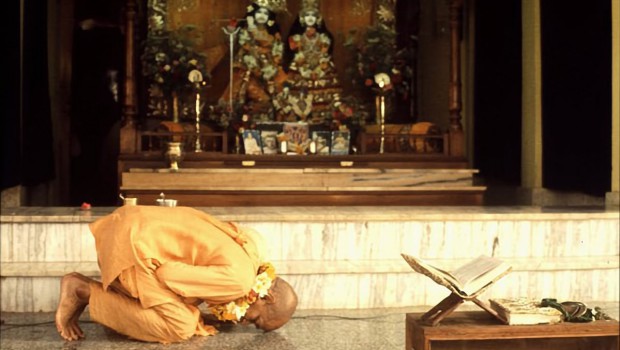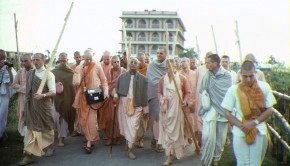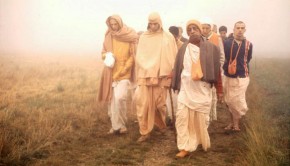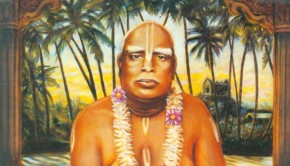Identifying Who is Authorized to Initiate.
After visiting the temple I could understand that different devotees were worshiping different individuals whom they had accepted as their spiritual master. As I recall now there were different guru pujas taking place at which time a partition covered the murti of His Divine Grace A.C. Bhaktivedanta Swami Prabhupada, thus putting His Divine Grace out of sight.
A response to the Sastric Advisory Council
Dear Prabhus, please accept my most humble obeisances.
I would like to humbly submit a reply to the recent article posted by the Sastric Advisory Council in response to The Prominent Link:
I came in contact with the movement in ’93’, and from the very beginning I was presented with information concerning the “guru issue”. After visiting the temple I could understand that different devotees were worshiping different individuals whom they had accepted as their spiritual master. As I recall now there were different guru pujas taking place at which time a partition covered the murti of His Divine Grace A.C. Bhaktivedanta Swami Prabhupada, thus putting His Divine Grace out of sight. Having been new to the Krishna Consciousness Movement at the time I wasn’t quite sure what to make of it. A minority of persons claimed that ISKCON had deviated after the departure of Srila Prabhupada and never gotten back on track. They claimed that Srila Prabhupada had instructed that after his departure some disciples were to conduct initiations on his behalf. New initiates were to be disciples of Srila Prabhupada. The majority of devotees however, accepted the idea that Srila Prabhupada had authorized for his disciples to initiate their own disciples. Anything counter to this was considered by most to be heresy.
It was clear that practically everyone was in agreement on one point and accepted it as a fact – that after Srila Prabhupada’s departure a zonal acharya system operated for about 10 years until many of the 11 ‘gurus’ fell down and it became obvious that something was very wrong. I came across a BTG from ’87’ with a column titled ‘An Apology’, in which the editors admitted to supporting what they called an erroneous zonal acarya system and said that it was overthrown by a ‘guru reform movement’ which had successfully reestablished Srila Prabhupada’s actual instructions. According to popular belief it was at that time that ISKCON installed the bonafide system which supposedly authorized anyone to initiate their own disciples provided they were strictly following for some time. By ’93’ this system had been operating for several years; yet another point acknowledged by both sides to be a fact -that many of the new gurus had fallen down as well. It was brought to my attention that there were even some devotees who had been “initiated”, or what is called “reinitited” , two or three times by different gurus who had fallen down one after another. It seemed that many devotees were unsure of their connection to the parampara and wondering “who is the ‘real’ acharya ?” At that time there were already 60 or 70 initiating gurus. It would often be said that if you’re sincere Krishna in the heart will lead you to who is bonafide. Evidently however, many of the devotees who were accepting this system, simultaneously were not confident that all or even most of the initiating gurus were actually bonafide. One devotee would encourage “come to my guru maharaj”, another devotee would say “be wary of others, check out my guru maharaj.” It all seemed quite strange, and it was obviously not the worldwide united International Society for Krishna Consciousness that I had heard about, read about, or witnessed in early BTG’s.
I had to seriously ask myself “is this really the system that Srila Prabhupada authorized, or have motivations for personal aggrandizement overthrown the leadership of ISKCON ?” I found in many places that Srila Prabhupada often warned that the Gaudiya Math had introduced an unauthorized system of rubberstamping acharyas, and that ISKCON must be careful not to make the same mistake. It was brought to my attention that the ISKCON initiating gurus are subject to a voting board which must give a 2/3 approval, and that the position is basically taken on by one’s own initiative after deciding for oneself that one feels qualified to initiate his own disciples. I had read however that Srila Prabhupada said an acharya was not to be nominated. Taking everything into consideration, I had to seriously consider the circumstances and the warnings that Srila Prabhupada was giving. I myself would eventually need to formally accept an initiating spiritual master. That decision I felt to be a matter of life and soul, one to be made only after seriously scrutinizing the matter. How could such a decision be made whimsically, without sufficient insight, or as a matter of fashion ? Srila Prabhupada states:
“The Hari-bhakti-vilasa (2.6) quotes the following injunction from the Visnu-yamala:”Unless one is initiated by a bona fide spiritual master, all his devotional activities are useless. A person who is not properly initiated can descend again into the animal species.”(From the purport of Madhya 15.108)
A devotee must have only one initiating spiritual master because in the scriptures acceptance of more than one is always forbidden […] One who is not properly initiated may present himself as a great devotee, but in fact he is sure to encounter many stumbling blocks on his path of progress toward spiritual realization, with the result that he must continue his term of material existence without relief. […] Sri Jiva Gosvami advises that one not accept a spiritual master in terms of hereditary or customary social and ecclesiastical conventions. (Adi 1.35 Purport )
“His idea was acarya was not to be nominated amongst the governing body” (referring to Srila Bhaktisiddhnta Sarasvati Gosvami Maharaj) ( Srila Prabhupada Letter to Rupanuga 4/28/74)
The result is now everyone is claiming to be acarya even though they may be kanistha adhikari with no ability to preach. In some of the camps the acarya is being changed three times a year. Therefore we may not commit the same mistake in our ISKCON camp. (Letter to Rupanuga 4/28/74)
“Mundane votes have no jurisdiction to elect a Vaisnava acarya. A Vaisnava acarya is self-effulgent, and there is no need for any court judgment.”(Purport Madhya 1.220)
“Try to understand. Don’t go very speedily. A guru can become guru when he’s ordered by his guru. That’s all. Otherwise nobody can become guru.” (Lecture 10/28/75)
“But sometimes, if a spiritual master is not properly authorized and only on his own initiative becomes a spiritual master, he may be carried away by an accumulation of wealth and large numbers of disciples.” (NOD 14)
“One should not try to be an artificially advanced devotee, thinking, “I am a first-class devotee.” Such thinking should be avoided. It is best not to accept any disciples.” (Madhya 7.130)
These statements and many others I found to be clearly at odds with the idea that someone can become a diksa guru authorized to initiate one’s own disciples by taking the position out of one’s own initiative combined with the approval of a voting board – (the GBC; who conducts the voting and has referred to itself as “the highest eccliastical body guiding ISKCON”. Most, if not all of the GBC members have become initiating gurus themselves) It seemed uncanny that ISKCON appeared to be doing exactly the same thing that Srila Prabhupada expressed strong disapproval of when he spoke of the Gaudiya Math’s position after the disappearance of his spiritual master Srila Bhaktisiddhnta Sarasvati Gosvami Maharaj. As Srila Prabhupada has said before “history repeats itself.” It was evident that for the following reason many persons were assuming the post of initiating spiritual master:
“A guru is worshiped… Just like my disciples. They are offering respect exactly like God. That is their duty. Saksad-dharitvena samasta-sastraih: “All the sastra recommends that guru should be respected as good as God.” (lecture 7/15/75 San Francisco)
(The Supreme Personality of Godhead said:) “Our next spiritual master is he who initiates us into transcendental knowledge, and he is to be worshiped as much as I am. The spiritual master may be more than one. The spiritual master who instructs the disciples about spiritual matters is called siksa-guru, and the spiritual master who initiates the disciple is called diksa-guru. (KB 80)
In this statement the Supreme Personality of Godhead Lord Krishna states that it is specifically the initiating spiritual master who is to be worshiped as much as Himself.
Srila Prabhupada explains that we’ve all come into material existence desiring to be God, but that it’s impossible. It made perfect sense to me to that when the desire to be God cannot be fulfilled, what naturally may follow is the desire to be guru who is worshiped as good as God.
What is the symptom of bona fide spiritual master? Everyone wants to become spiritual master. […] he has taken shelter of the Supreme Absolute Truth, without any material desires. He has no more any material desires; he’s simply interested in Krsna, or the Absolute Truth. (B.g. Lecture Pittsburgh, September 8, 1972)
From Srila Prabhupada we know that one who is actually a bonafide spiritual master has no interest in fame, profit, reputation or adoration for himself. He has no personal motivation whatsoever. He is completely pure and situated on the topmost platform.Thus he is factually as good as God and worthy of the highest honor.
” The guru must be situated on the topmost platform of devotional service. There are three classes of devotees, and the guru must be accepted from the topmost class. The first-class devotee is the spiritual master for all kinds of people.” (Madhya 24.330)
” When one has attained the topmost position of maha-bhagavata, he is to be accepted as a guru and worshiped exactly like Hari, the Personality of Godhead. Only such a person is eligible to occupy the post of a guru.” (Madhya 24.331 purport)
” One should not become a spiritual master unless he has attained the platform of uttama-adhikari. A neophyte Vaisnava or a Vaisnava situated on the intermediate platform can also accept disciples, but such disciples must be on the same platform, and it should be understood that they cannot advance very well toward the ultimate goal of life under his insufficient guidance. Therefore a disciple should be careful to accept an uttama-adhikari as a spiritual master.”(NOI 5)
“Unless one is a resident of Krishna Loka, one cannot be a Spiritual Master.” (Letter Mukunda 6/10/69)
There is no possibility that a first-class devotee will fall down” (Madhya 22.71)
After reading up on presenations from both sides of the issue – there was only more and more evidence weighing to the claim that ISKCON’s current system is not in fact what Srila Prabhupada has actually authorized.
It is apparent that the majority of devotees in ISKCON accept the current system having been indoctrinated by ISKCON leaders to believe that it is correct. Most have never been properly informed or taken the opportunity to investigate the matter for themselves. The ominous tone in ISKCON temples has discouraged individuals from asking questions contrary to popular belief; such inquiries are likely to be met with the threat of being ostracized, banished and outcaste. Although gross falldowns and abandonment of guruship continues to go on regularly up until today, ISKCON continues to operate on a system wherein numerous individuals assume the role of initiating spiritual master. Somehow or other it continues to go on and more propoganda and rationalizations continue to be produced by ISKCON leaders. The prominent question “Who is your guru ?” continues to resound throughout ISKCON.
The Shastric Advisory Council’s presentation in response to ‘The Prominent Link’ is the latest endeavor to perpetuate the current system by insisting that there is absolutely no possibility that anyone today or ever could become connected to Srila Prabhupada in a guru-disciple diksa relationship. It is based on the common assumption that a diksa guru must be physically present in order to accept a disciple and give guidance; but this philosophy is not actually supported by Srila Prabhupada and all of the arguments used to support this belief are obliterated by numerous examples and statements from Srila Prabhupada. The very idea itself that Srila Prabhupada is everyone’s siksa guru simultaneously confirms that Srila Prabhupada can in fact today still give diksa and remain the current acarya.
“Diksa actually means initiating a disciple with transcendental knowledge by which he becomes freed from all material contamination.” (Madhya 4.111)
The fact that Srila Prabhupada can give siksa, instruction, through his transcendental vani, proves that he can also give diksa, which is essentially one and the same: achintya-bheda bheda-tattva. Srila Prabhupada explains that siksa and diksa are both instructing spiritual masters and because their instructions are nondifferent the both are understood to be one.
“There are two kinds of instructing spiritual masters. One is the liberated person fully absorbed in meditation in devotional service, and the other is he who invokes the disciple’s spiritual consciousness by means of relevant instructions.” (Adi 1.47)
Therefore there is no difference between siksa-guru and diksa-guru because if he’s actually guru, he’ll not say anything which Krsna has not spoken. Yare dekha tare kaha ‘krsna’-upadesa. So guru is that. Caitanya Mahaprabhu says, amara ajnaya guru hana tara’ ei desa: “You become a guru.” And what is the function of the guru? Yare dekha tare kaha ‘krsna’-upadesa. That is there. You haven’t got to manufacture any instruction. Whatever is said in the Bhagavad-gita, you say. (Lec 1/31/77)
In the following verse a distinction is made that the initiating spiritual master actually is a personal manifestation of the Supreme Personality of Godhead, whereas the instructing spiritual master is a personal representative.
The initiating spiritual master is a personal manifestation of Srila Madana-mohana vigraha, whereas the instructing spiritual master is a personal representative of Srila Govindadeva vigraha. (Adi 1.47)
The only other distinction found is that a diksa guru in particular assumes the karma, or sinful reactions of a disciple, and therefore must be very powerful, situated on the topmost level as mahabhagavata, uttama adhikari – an advanced devotee who is factually as good as God and thus offered the same honor and worshiped on the same level as Lord Krishna, the Supreme Personality of Godhead Himself.
“According to Srila Jiva Gosvami, a preacher has to accept many disciples to expand the cult of Sri Caitanya Mahaprabhu. This is risky because when a spiritual master accepts a disciple, he naturally accepts the disciple’s sinful activities and their reactions. Unless he is very powerful, he cannot assimilate all the sinful reactions of his disciples. Thus if he is not powerful, he has to suffer the consequences, for one is forbidden to accept many disciples.” (Madhya 22.118)
This is why Srila Prabhupada has cautioned of the following:
” One should not become a spiritual master unless he has attained the platform of uttama-adhikari. Therefore a disciple should be careful to accept an uttama-adhikari as a spiritual master.” (NOI5)
” When one has attained the topmost position of maha-bhagavata, he is to be accepted as a guru and worshiped exactly like Hari, the Personality of Godhead. Only such a person is eligible to occupy the post of a guru.” (Madhya 24.331 purport)
” The guru must be situated on the topmost platform of devotional service. There are three classes of devotees, and the guru must be accepted from the topmost class. The first-class devotee is the spiritual master for all kinds of people.” (Madhya 24.330)
Srila Prabhupada has given strong warning for an aspiring disciple to beware of the danger of accepting a spiritual master who is not an uttama- adhikari, and he has warned the preacher who is not yet on this platform the dangers of accepting disciples. Ultimatelty Srila Prabhupada instructs:
“It is best not to accept any disciples” (Madhya 7.130), and follows up in this purport to the famous “amara ajnaya guru, everyone become spiritual master” verse, by simply instructing to preach Krishna Consciousness in a practical way. This verse has been presented time and time again by advocates of the current ISKCON guru system and always it is insistently presented with the notion that “become spiritual master” means to initiate one’s own disciples, even though in the very purport to the verse it actually states that “it is best not to accept ANY disciples”, and gives no authorization whatsoever for doing so. It is a complete misinterpretation to present this verse in itself as a standing authorization for anyone and everyone to initiate his own disciples whenever he feels himself ready.
The general rationale is that a praisworthy individual takes on the post for the purpose of expanding the movement. Alot of sentiment is given to this notion. The problem with this is twofold: Srila Prabhupada says that one must first be qualified by coming to the level of uttama-adhikari, a 100% pure devotee, and secondly that he must have authorization, a specific order to accept one’s own disciples. One who is actually qualified, being humble truly feels that he is not qualified, but because he is given a specific order by his spiritual master, he takes on the position of initiating disciples.
” One should not try to be an artificially advanced devotee, thinking, “I am a first-class devotee.” Such thinking should be avoided. It is best not to accept any disciples.” (Madhya 7.130)
It is not that authorization is established by one’s own initiative when after practicing sadhana and preaching for some years one suddenly feels “Yes I am now ready, I shall initiate my own disciples.”The order of Srila Prabhupada must be there, if not then such a person is acting independently and against the order of Srila Prabhupada.
He’s asking when did you become the spiritual leader of Krsna consciousness?
Prabhupada: When my Guru Maharaja ordered me. This is the guru-parampara.
Indian: Did it…
Prabhupada: Try to understand. Don’t go very speedily. A guru can become guru when he’s ordered by his guru. That’s all. Otherwise nobody can become guru.(Lecture 10/28/75)
Although the instruction given in Caitanya Caritamrta is that it is best not to accept ANY disciples, this obviously does not apply to the uttama adhikari:
“Anyone can see how the bona fide spiritual master accepts disciples from all over the world. (Purport C.C. 24.330)
“the devotees of Lord Caitanya are so powerful that each one of them can deliver a universe.” (Purport S.B. 4.24.58 )
“If they so desire, powerful spiritual masters, or pure devotees of the Lord, can instantly deliver the entire universe and take everyone to the shelter of the Supreme Lord’s lotus feet.” (RTW 2.3)
We can say with conviction that Srila Prabhupada meets all of the above descriptions and qualifications of a bonafide diksa guru and is a powerful acharya capable of delivering the entire universe. There is no reason to deny that Srila Prabhupada can still today give diksa. The only reason it would be denied is by the influence of Kali working through self invested individuals in the guise of Vaishnavas who in the ultimate end are against having Srila Prabhupada being glorified as jagad guru, the initiating spiritual master of the world.
Such cheating gurus should not be accepted. Anyone can see how the bona fide spiritual master accepts disciples from all over the world. The guru is a qualified brahmana; therefore he knows Brahman and Parabrahman. He thus devotes his life for the service of Parabrahman. The bona fide spiritual master who accepts disciples from all over the world is also worshiped all over the world because of his qualities. Lokanam asau pujyo yatha harih: the people of the world worship him just as they worship the Supreme Personality of Godhead. (Madhya 24.330)
There are many jealous people in the dress of Vaisnavas in this Krsna consciousness movement, and they should be completely neglected. There is no need to serve a jealous person who is in the dress of a Vaisnava. When Narottama dasa Thakura says chadiya vaisnava seva nistara payeche keba, he is indicating an actual Vaisnava, not an envious or jealous person in the dress of a Vaisnava. (Madhya 1.218)
A jealous person in the dress of a Vaisnava is not at all happy to see the success of another Vaisnava in receiving the Lord’s mercy. Unfortunately in this Age of Kali there are many mundane persons in the dress of Vaisnavas, and Srila Bhaktivinoda Thakura has described them as disciples of Kali. He says, kali-cela. He indicates that there is another Vaisnava, a pseudoVaisnava with tilaka on his nose and kanthi beads around his neck. Such a pseudoVaisnava associates with money and women and is jealous of successful Vaisnavas. Although passing for a Vaisnava, his only business is earning money in the dress of a Vaisnava. Bhaktivinoda Thakura therefore says that such a pseudoVaisnava is not a Vaisnava at all but a disciple of Kali-yuga. A disciple of Kali cannot become an acarya by the decision of some high court. Mundane votes have no jurisdiction to elect a Vaisnava acarya. A Vaisnava acarya is self-effulgent, and there is no need for any court judgment. A false acarya may try to override a Vaisnava by a high-court decision, but Bhaktivinoda Thakura says that he is nothing but a disciple of Kali-yuga. (Madhya 1.220)
Prabhupada: Then so siksa and diksa-guru… A siksa-guru who instructs against the instruction of spiritual, he is not a siksa guru. He is a demon. Siksa-guru, diksa-guru means… Sometimes a diksa-guru is not present always. Therefore one can take learning, instruction, from an advanced devotee. That is called the siksa-guru. Siksa-guru does not mean he is speaking something against the teachings of the diksa-guru. He is not a siksa-guru. He is a rascal.(Lec 7-4-74Honolulu)
To deny that Srila Prabhupada can continue to give diksa, to attempt to limit his offering of diksa to a fixed number of individuals within a brief span of 12 years, or to essentially refuse acknowledging Srila Prabhupada’s exalted post as jagad guru-spiritual master of the entire world – could not possibly be a credit to assisting this Krishna Consciousness Movement in spreading to every town and village throughout the globe. Every disciple of Srila Prabhupada has the order to contribute to this end, and it will come about when disciples work together to make widely available the vani and diksa of Srila Prabhupada. Let us not obstruct the people of the world from coming under the shelter of His Divine Grace through the process of diksa initiation. Let there be widescale unified glorification of the jagad guru mahabhagavata devotee of the Lord.
Would it not have been for the mercy of Srila Prabhupada, none of us would even have the slightest understanding of our relationship with Lord Krishna.
Nowhere has it been found to date, any authorization from Srila Prabhupada to have ever discontinued the system of initiations authorized by the July 9th letter to all temple presidents and GBC’s. It is the only letter specifying instructions on initiations ever issued to all ISKCON leaders. The ‘zonal acarya’ system failed because it was a deviation of Srila Prabhupada’s actual instruction for a system of officiating acaryas, qualified siksa gurus, stationed in strategic zones for the purpose of performing initiation ceremonies on behalf of Srila Prabhupada. The discontinuance of this system based upon assumptions, rationalizations and word juggleries will never be accepted by the intelligent class of people. The leaders of ISKCON are each responsible for carrying out this order of Srila Prabhupada or otherwise to be held accountable for obstructing the wide scale expansion of Srila Prabhupada’s mission to save the world.
Srila Prabhupada’s July 9th Order
(drafted by Srila Prabhupada’s secretary with Srila Prabhupada’s approval and signature of authorization)
To All G.B.C., and Temple Presidents
Dear Maharajas and Prabhus,
Please accept my humble obeisances at your feet. Recently when all of the GBC members were with His Divine Grace in Vrndavana, Srila Prabhupada indicated that soon he would appoint some of His senior disciples to act as “rittik”- representative of the acarya, for the purpose of performing initiations, both first initiation and second initiation. His Divine Grace has so far given a list of eleven disciples who will act in that capacity. His Holiness Kirtanananda Swami
His Holiness Satsvarupa das Gosvami
His Holiness Jayapataka Swami
His Holiness Tamal Krsna Gosvami
His Holiness Hrydananda Gosvami
His Holiness Bhavananda Gosvami
His Holiness Hamsadhutta Swami
His Holiness Ramesvara Swami
His Holiness Harikesa Swami
His Holiness Bhagavan das Adhikari
His Grace Jayatirtha das Adhikari
In the past Temple Presidents have written to Srila Prabhupada recommending a particular devotee’s initiation. Now that Srila Prabhupada has named these representatives, temple Presidents may henceforward send recommendations for first and second initiation to whichever of these eleven representatives are nearest their temple. After considering the recommendation, these representatives may accept the devotee as an initiated disciple of Srila Prabhupada by giving a spiritual name, or in the case of second initiation, by chanting on the gayatri thread, just as Srila Prabhupada has done. The newly initiated devotees are disciples of His Divine Grace A.C. Bhaktivedanta Swami Prabhupad, the above eleven senior devotees acting as His representatives. After the temple president receives a letter from these represenatatives giving the spiritual name or the thread, he can perform the fire yajna in the temple as was being done before. The name of the newly initiated disciple should be sent by the representative who has accepted him or her to Srila Prabhupad, to be included in His Divine Grace’s “Initiated Disciples” book.
Hoping this finds you all well.
Your servant,
(Signature of Tamal Krishna Goswami)
Tamal Krsna Gosvami
Secretary to Srila Prabhupada
Approved
(Signature of approval – A.C. Bhaktivedanta Swami)














